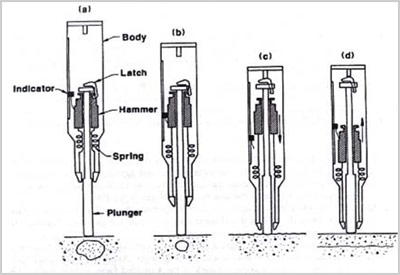The Schmidt rebound hammer is principally a surface hardness tester. It works on the principle that the rebound of an elastic mass depends on the hardness of the surface against which the mass impinges. There is little apparent direct theoretical relationship between the strength of concrete and the rebound number of the hammer. However, within limits, empirical correlations have been established between strength properties and the rebound number.
Although the rebound hammer does provide a quick, inexpensive method of checking the uniformity of concrete, it has some serious limitations. The results are affected by:
- Smoothness of the test surface
- Size, shape and rigidity of the specimen
- Age of the specimen
- Surface and internal moisture conditions of concrete
- Type of coarse aggregate
- Type of cement
- Carbonation of the concrete surface
 |
|